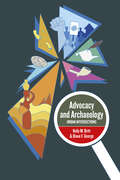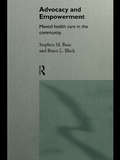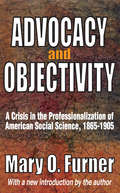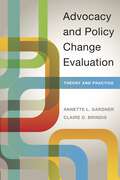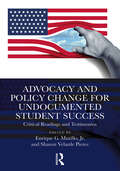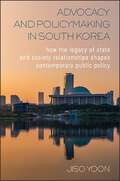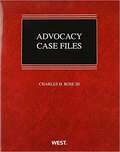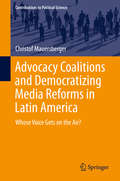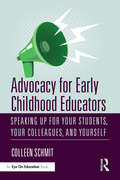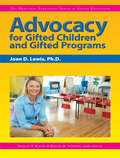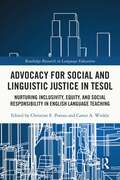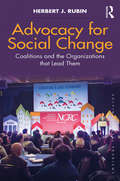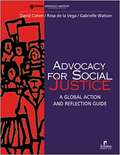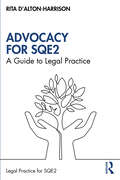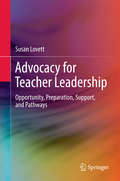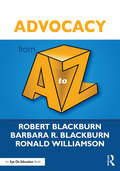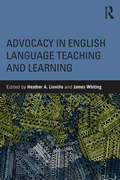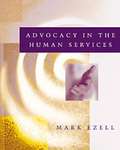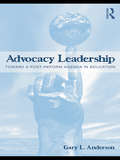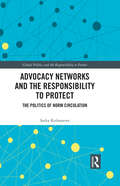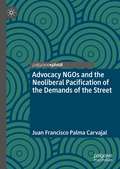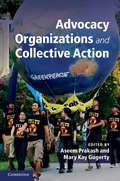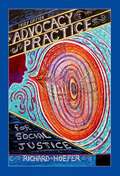- Table View
- List View
Advocacy
by David Ross QcAdvocacy, first published in 2007, explains how to win cases in court. Focusing on the techniques and methods of successful advocates, David Ross QC shows how to prepare a case for court. Writing in simple, clear language he gives the benefit of his many years of local and international experience. This second edition features new advice about how to prepare for, and run, an appeal, as well as how to write effective submissions to court. It also describes: • how to hold a court's attention • how to start and stop a witness • how to cross-examine all types of people, from liars to experts • the methods of taking objections to questions • how to address a jury • how to follow etiquette and behave ethically • how to win impossible cases All the principles of advocacy are explained, from the striking start to knowledge of human affairs, and Advocacy is rich with examples taken from real cases.
Advocacy and Archaeology: Urban Intersections
by Kelly M. Britt and Diane F. GeorgeArchaeologists have a history of being prime agents of change, particularly in advocating for protection and preservation of historical resources. As more social issues intersect with archaeology and historical sites, we see archaeologists and others continuing to advocate for not only historic resources, but for the larger social justice issues that threaten the communities in which these resources reside. Inspired by the idea of revolution and excitement about the ways archaeology is being used in social justice arenas, this volume seeks to visualize archaeology as part of a movement by redefining what archaeology is and does for the greater good.
Advocacy and Empowerment: Mental Health Care in the Community
by Bruce L. Black Stephen M. RoseRelevant and thought-provoking, describes a new and imaginative approach to the needs of de-institutionalised people returning to care in the community. It shows that there is a challenging but dynamic contribution to be made by all community mental health workers in restoring dignity to the lives of those who have tragically been robbed of such a basic human need.
Advocacy and Objectivity: A Crisis in the Professionalization of American Social Science, 1865-1905
by Mary FurnerThis award-winning book of the Frederick Jackson Turner Studies describes the early development of social science professions in the United States. Furner traces the academic process in economics, sociology, and political science. She devotes considerable attention to economics in the 1880s, when first-generation professionals wrestled with the enormously difficult social questions associated with industrialization. Controversies among economists reflected an endemic tension in social science between the necessity of being recognized as objective scientists and an intense desire to advocate reforms.Molded by internal conflicts and external pressures, social science gradually changed. In the 1890s economics was defined more narrowly around market concerns. Both reformers and students of social dynamics gravitated to the emerging discipline of sociology, while political science professionalized around the important new field of public administration. This division of social science into specialized disciplines was especially significant as progressivism opened paths to power and influence for social science experts.Professionalization profoundly altered the role and contribution of social scientists in American life. Since the late nineteenth century, professionals have exerted increasing control over complex economic and social processes, often performing services that they themselves have helped to make essential. Furner here seeks to discover how emerging groups of American social scientists envisioned their role what rights and responsibilities they claimed how they hoped to perform a vital social function as they fulfilled their own ambitions, and what restraints they recognized.
Advocacy And Opposition: An Introduction To Argumentation, Seventh Edition
by Karyn Charles Rybacki Donald Jay RybackiAdvocacy and Opposition: An Introduction to Argumentation presents a comprehensive and practical approach to argumentation and critical thinking for the beginner who needs to construct and present arguments on questions of fact, value, and policy. Advocacy and Opposition offers a theoretical view of the nature of argument in our society, a discussion of arguing as a form of communication, and a focus on how arguments are created using the Toulmin model of argument. By blending traditional and contemporary views on the nature of argument (including multicultural perspectives on the purpose and process of argument, ethics, and values), Advocacy and Opposition makes students more aware of both the development of theory and practice, providing a well-rounded approach to their study of argumentation.
Advocacy and Policy Change Evaluation: Theory and Practice
by Claire Brindis Annette GardnerThis is the first book-length treatment of the concepts, designs, methods, and tools needed to conduct effective advocacy and policy change evaluations. By integrating insights from different disciplines, Part I provides a conceptual foundation for navigating advocacy tactics within today's turbulent policy landscape. Part II offers recommendations for developing appropriate evaluation designs and working with unique advocacy and policy change–oriented instruments. Part III turns toward opportunities and challenges in this growing field. In addition to describing actual designs and measures, the chapters includes suggestions for addressing the specific challenges of working in a policy setting, such as a long time horizon for achieving meaningful change. To illuminate and advance this area of evaluation practice, the authors draw on over 30 years of evaluation experience; collective wisdom based on a new, large-scale survey of evaluators in the field; and in-depth case studies on diverse issues—from the environment, to public health, to human rights. Ideal for evaluators, change makers, and funders, this book is the definitive guide to advocacy and policy change evaluation.
Advocacy and Policy Change for Undocumented Student Success: Critical Readings and Testimonios
by Enrique G. Murillo Sharon Velarde PierceAdvocacy and Policy Change for Undocumented Student Success is a compelling exploration of the undocumented student experience in America, offering a deep dive into the advocacy, education, and systemic challenges faced by undocumented communities.Compiling the most significant work in the field in terms of its contributions to research and professional practice, this volume uncovers the historical struggles and triumphs of undocumented students and their families in their quest for educational access and equity. From pivotal legal milestones to personal narratives of resilience and adversity, this collection paints a comprehensive picture of the ongoing battle against legal and societal barriers. It delves into the mental health impacts of living undocumented and presents innovative strategies and policy reforms aimed at bridging the gap between harsh realities and hopeful aspirations. A clarion call to action, this volume is an invitation to join the fight for a more equitable and inclusive society, recognizing the vital contributions of undocumented individuals and advocating for systemic change.Advocacy and Policy Change for Undocumented Student Success is a must-have resource for graduate students and researchers in Educational Leadership and Policy, Multicultural Education, and Teacher Education. It will also be an important reading for educational leaders, teachers, counselors, administrators, and organizations that share a common interest in and commitment to the educational issues that impact undocumented students and their families.
Advocacy and Policymaking in South Korea: How the Legacy of State and Society Relationships Shapes Contemporary Public Policy
by Jiso YoonWho dominates in the contemporary policy process in South Korea? How do policy advocates engage in advocacy activities to exercise influence? Building on existing theories of state, society, and public policies in democracies, Advocacy and Policymaking in South Korea argues that the legacy of state-society relationships explains who influences and how in South Korean policymaking. The state-society relationship has been a popular framework to explain democratic transition and consolidation. Yet, few studies to date extend the approach to explain advocacy and policymaking across political systems. Jiso Yoon shows the relevance of the framework in explaining advocacy and policymaking today with empirical evidence drawn from the contemporary policy process in South Korea. In addition, she compares policy communities across new and old democracies, such as South Korea and the United States. In this regard, the comparative analysis included in the book sets an important research example for students of comparative public policy to follow.
Advocacy Case Files (Coursebook)
by Charles H. RoseThis text contains two real-world case files reflecting the realities of 21st Century trial practice. Designed from the ground up to challenge and develop a student's advocacy skills and analytical excellence, the text's multiple potential levels of complexity adapt easily for use with any advocacy text. The complete teacher's manual provides a thorough case analysis, suggested assignments, and outcome-driven assessments, enabling the professor to focus on teaching the law, skill, and art of advocacy.
Advocacy Coalitions and Democratizing Media Reforms in Latin America: Whose Voice Gets on the Air? (Contributions to Political Science)
by Christof MauersbergerThis book examines democratizing media reforms in Latin America. The author explains why some countries have recently passed such reforms in the broadcasting sector, while others have not. By offering a civil society perspective, the author moves beyond conventional accounts that perceive media reforms primarily as a form of government repression to punish oppositional media. Instead, he highlights the pioneering role of civil society coalitions, which have managed to revitalize the debate on communication rights and translated them into specific regulatory outcomes such as the promotion of community radio stations. The book provides an in-depth, comparative analysis of media reform debates in Argentina and Brazil (analyzing Chile and Uruguay as complementary cases), supported by original qualitative research. As such, it advances our understanding of how shifting power relations and social forces are affecting policymaking in Latin America and beyond.
Advocacy for Early Childhood Educators: Speaking Up for Your Students, Your Colleagues, and Yourself
by Colleen SchmitBecome a better advocate—for your students, for your coworkers, and for yourself—with the valuable strategies in this accessible guidebook. Written with a candid and humorous style, this tool kit reinforces why effective early childhood education matters and the positive impact an effective advocate can have on a child’s classroom experience. Chapters explore how to explain and support best practices, build relationships with students and families, speak up for English language learners and students with exceptionalities, reduce coworker conflict and negativity, and reach out for the help you need. Equipping readers with practical takeaways and everyday examples of what advocacy in early childhood education actually looks like, Advocacy for Early Childhood Educators is perfect for teachers, coaches, and anyone seeking effective strategies to become a relentless advocate for their students, for each other, and for themselves.
Advocacy for Gifted Children and Gifted Programs
by Joan D. LewisSupporters of gifted education need to develop the skills of advocacy in order to help build strong, lasting, effective programs. Advocacy for Gifted Children and Gifted Programs describes a wide variety of successful strategies that can be used to advocate for gifted students at all levels.
Advocacy for Social and Linguistic Justice in TESOL: Nurturing Inclusivity, Equity, and Social Responsibility in English Language Teaching (Routledge Research in Language Education)
by Christine E. Poteau Carter A. WinkleRecognizing the need for increased social justice in the fields of TESOL and English Language Teaching (ELT) globally, this volume presents a range of international case studies and empirical research to demonstrate how English language instruction can promote social and linguistic justice through advocacy-oriented pedagogies and curricula. Advocacy for Social and Linguistic Justice in TESOL adopts a critical, and evidence-based approach to identifying effective practice in ensuring inclusive and equitable learning and teaching. Chapters address emergent issues including heritage language and L1 attrition, teacher and learner identity, and linguistic colonialism, as well as wider issues such as global citizenship and human rights. Focus is placed on empowering both educators and learners as advocates of social justice and consideration is also given to how social responsibility can be supported through enhanced teacher preparation and professional development. Making a timely contribution at the intersection of advocacy, social justice, and English language teaching, this book will be key reading for postgraduate researchers, scholars, and academics in the fields of TESOL and ELT, as well as language education, applied linguistics, and the sociology of education more broadly. English language teachers and practitioners will also find this volume of interest.
Advocacy for Social Change: Coalitions and the Organizations That Lead Them (Solving Social Problems)
by Herbert J. RubinThis book portrays how small, geographically dispersed, and progressive social change and social service organizations working within a coalition can influence national-level social policies. Based on extensive empirical research on two national organizations and their local affiliates, one focusing on affordable housing and the other working to protect lower-income communities, this book shows the ways in which professionally staffed organizations that coordinate coalitions come about, and describes their work to mobilize coalition members to lobby and advocate, providing information, analysis and instruction to facilitate such action and, in so doing, becoming the public voice for the social change efforts of coalitions. Advocacy for Social Change details the characteristics of these organizations that the author has labeled as focal catalytic coalition organizations and then provides numerous examples of campaigns led by them on affordable housing and economic justice; campaigns that illustrate tactics that other social change organizations can emulate. As such, it will appeal to scholars of sociology with interests in social problems, social action, political sociology, urban studies, community development and organizing while extending the literature on interest group lobbying.
Advocacy For Social Justice: A Global Action And Reflection Guide
by David Cohen Rosa De la Vega Gabrielle WatsonAdvocacy for Social Justice is the first guide for worldwide social and economic justice advocates. It is a direct and interactive response to the growing need for NGOs to assume new policy advocacy roles. The authors consider why it is essential to build a civil society and nurture democracy as a means of sustaining continued mainstream development. Ideal for practitioners, trainers, or students of activism, the guide uses the elements of advocacy and expounds on current issues using comprehensive case studies.
Advocacy for SQE2: A Guide to Legal Practice (Legal Practice for SQE2)
by Rita D'Alton-HarrisonAdvocacy for SQE2: A Guide to Legal Practice is the first in a new series of books aimed at those preparing for SQE2, providing a comprehensive overview of everything you need to successfully pass the SQE2 advocacy assessment. Split into the two practice sections that candidates may be tested on – dispute resolution (civil) as well as criminal litigation – the book covers the basics of court procedure in both areas, so that you fully understand the role, duties and responsibilities of an advocate. In line with the requirements of SQE2, it also tests the competency skills required of an advocate in legal practice such as planning and organisation, drafting, legal research, presenting a reasoned argument, witness handling, observation, exercising judgment and the application of knowledge and decision-making. It also includes a range of supporting features, including: In Summary sections Key Practice Cases Practice Tips Practice Risks Problem Based Exercises Realistic Case Scenarios Self-Reflection Checklist Further supporting materials are also provided on the companion website. Written by an author with practice experience and early involvement in the planning and development of the SQE itself, this unique book will be essential reading for any candidate wishing to be fully prepared for their SQE2 advocacy assessment.
Advocacy for Teacher Leadership: Opportunity, Preparation, Support, and Pathways (SpringerBriefs in Education)
by Susan LovettThis book advocates for an alternative to the hierarchical positioning of leaders. It proposes to value leadership practices which emerge from collective concerns about learning and the realisation that collegial interactions offer opportunities for rich explorations of pedagogy and new understandings to be developed. The book draws upon illustrative examples from a longitudinal study of early career teachers, entitled "Teachers of Promise: Aspirations and realities". It explores matters of personal ambition, support from significant others, and barriers to teacher leadership. It shows that these vary from context to context and individual to individual. Examples highlight the ways in which each teacher's experience has been enabled and constrained by different considerations. In combination, the examples offered demonstrate the need for the teaching profession to be more systematic in identifying and supporting talented teachers who could be the leaders of learning for tomorrow. The book shows that individuals themselves need to have an openness to consider how they might become more effective teachers through their engagement in leadership work. This, it suggests, involves developing a different conception of leadership to counter the prevailing view that leadership is typically positional and defined by its distance from classroom teaching. The more promising portrayal is to link teacher leadership explicitly with learning.
Advocacy from A to Z (A to Z Series)
by Robert Blackburn Ronald Williamson Barbara R. BlackburnIn today’s educational climate, advocacy is a critical part of any teacher or leader’s job. Advocacy From A to Z unpacks the difficult task of understanding the movers and shakers—including teachers, parents, the union, legislatures, and policy makers—that impact your school, affect your students, and shape policy. Organized into 26 chapters—one for each letter of the alphabet— this book provides school-based examples and specific strategies needed to be a successful advocate for education. Advocacy begins at the local level, and the newest book in the A to Z series helps educational leaders navigate, plan, and shape their message to the right people at the right time. Now you can find your voice and become an active advocate to help your students succeed.
Advocacy in English Language Teaching and Learning
by Heather A. Linville James WhitingAppropriate for those new to the topic and established scholars, this holistic text examines the nexus of advocacy and English-language teaching, beginning with theories of advocacy, covering constraints and challenges in practice, and offering a range of hands-on perspectives in different contexts and with different populations. Bringing together wide-ranging and diverse viewpoints in TESOL, this volume examines the role of advocacy through a social justice lens in a range of contexts, including K-12 classrooms and schools, adult and higher education settings, families and communities, and teacher-education programs and professional organizations. Advocacy in English Language Teaching and Learning offers readers a deeper understanding of what advocacy is and can be, and gives teacher candidates and educators the tools to advocate for their students, their families and communities, and their profession.
Advocacy in the Human Services
by Mark EzellThe object of this book is to educate students and professionals so that they have a deeper understanding of advocacy practice in order to serve clients fully.
Advocacy Leadership: Toward a Post-Reform Agenda in Education (Critical Social Thought)
by Gary L. AndersonIn this timely and important new book, Gary Anderson provides a devastating critique of why a managerial role for educational leaders is counterproductive, especially for improving opportunities for low-income students and students of color, and instead proposes ways of re-theorizing educational leadership to emphasize its advocacy role. Advocacy Leadership lays out a post-reform agenda that moves beyond the neo-liberal, competition framework to define a new accountability, a new pedagogy, and a new leadership role definition. Drawing on personal narrative, discourse analysis, and interdisciplinary scholarship, Anderson delivers a compelling argument for the need to move away from current inauthentic and inequitable approaches to school reform in order to jump-start a conversation about an alternative vision of education today.
Advocacy Networks and the Responsibility to Protect: The Politics of Norm Circulation (Global Politics and the Responsibility to Protect)
by Sarka KolmasovaThis book contributes to existing debates on the Responsibility to Protect (R2P) by demonstrating new advocacy strategies and the greater interconnectedness of various R2P proponents. In 2021, the UN General Assembly adopted a new resolution on R2P, which reaffirmed its commitment from the 2005 World Summit Outcome and put R2P on the annual agenda. For many R2P proponents, this was another manifestation of worldwide R2P relevance and of growing support among UN members to protect people from genocide, war crimes, ethnic cleansing and crimes against humanity. Yet the existing crises in Myanmar, Venezuela, Belarus, Syria and many others revealed the widening gap between the discourse and practice. This book aims to find out what keeps the concept alive despite its indisputable pitfalls. In contrast to existing studies that treat the R2P endorsement or contestation as intertwined processes of norm evolution, it argues that the status of R2P has been accomplished by the conscious politics of its advocates operating in complex global networks. As such, the book puts emphasis on the agency of R2P champions and examines who keeps the idea resonating and how they manage to preserve its worldwide relevance. Rather than proposing a new model of advocacy, the book aims to pinpoint the politics of R2P's circulation, the importance of individual R2P champions and their interconnectedness through innovative forms of cooperation within complex networks. This book will be of much interest to students of the R2P, diplomacy, human rights, foreign policy and International Relations.
Advocacy NGOs and the Neoliberal Pacification of the Demands of the Street
by Juan Francisco Palma CarvajalThis book critically explores the role of two advocacy NGOs actively involved in processes of education policymaking during the recent education reforms carried out in Chile, the country known as the first laboratory of neoliberalism around the world. Based on Foucault’s theoretical work on governmentality the book argues that neoliberalism as a form of governmentality has permeated in Chilean policymaking, generating new forms of domination through freedom by situating NGOs as active and responsible subjects of government. In this way, this volume contests the supposed benefits of NGOs as a force to enhance democracy and foment social participation, arguing instead, that NGOs image as representatives of civil society can be used to pacify social movements demands for radical change and build a political consensus that serves to legitimate government interests in policymaking.
Advocacy Organizations and Collective Action
by Mary Kay Gugerty Aseem PrakashAdvocacy organizations are viewed as actors motivated primarily by principled beliefs. This volume outlines a new agenda for the study of advocacy organizations, proposing a model of NGOs as collective actors that seek to fulfil normative concerns and instrumental incentives, face collective action problems, and compete as well as collaborate with other advocacy actors. The analogy of the firm is a useful way of studying advocacy actors because individuals, via advocacy NGOs, make choices which are analytically similar to those that shareholders make in the context of firms. The authors view advocacy NGOs as special types of firms that make strategic choices in policy markets which, along with creating public goods, support organizational survival, visibility, and growth. Advocacy NGOs' strategy can therefore be understood as a response to opportunities to supply distinct advocacy products to well-defined constituencies, as well as a response to normative or principled concerns.
Advocacy Practice For Social Justice
by Richard HoeferCurrent economic and social forces are creating a society with less equality, justice and opportunity for all but the privileged few. Social workers are called upon by their code of ethics to counteract these trends and actively work to achieve social justice. Hoefer's empirically-based,step-by-step approach demonstrates how to integrate advocacy for social justice into everyday social work practice. The book shows through anecdotes, case studies, examples, and the author's own personal experiences, exactly how advocacy can be conducted with successful outcomes. Each chapter builds upon the previous to provide a concise yet detailed blueprint for conducting successful advocacy. The previous two editions of this book have been used and admired by professors and students alike. Students value its clarity and praise the book for opening their eyes to what they often believed was "the scary and bad" world of politics and policy. After reading the book, they are motivated to become advocates for social justice because they understand how to do so. If you want to empower your students to effect changes in laws, regulations, and other types of policy at all levels, you will find this text the perfect resource to do so.

